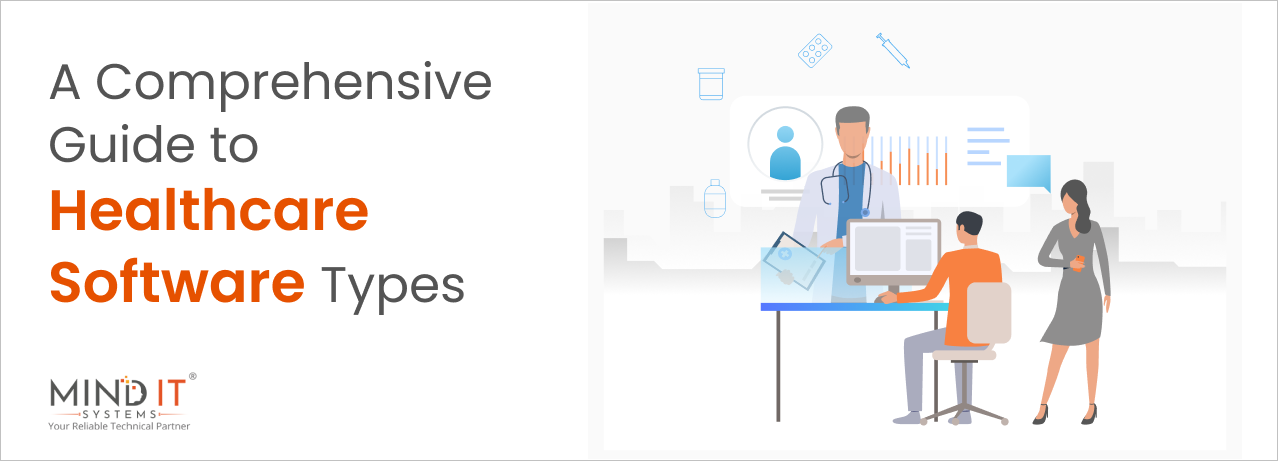
A Comprehensive Guide to Healthcare Software Types
Introduction
The role of information technology in healthcare has seen a significant increase in recent years, especially due to the COVID-19 pandemic. As per the Statista report, the Digital Treatment & Care market volume is expected to reach an impressive €153.00 bn by 2029, with a compound annual growth rate (CAGR) of 9.72%. This growth signifies a promising future for adopting digital and custom healthcare software solutions. In such a scenario, knowing the types of healthcare software revolutionizing the healthcare industry is always good.
This comprehensive guide provides all the information you need about healthcare software solutions, their types, and more. Whether you are a healthcare professional or a stakeholder, this guide is must-read.
Get ready to dive deeper for informative insights.
Let’s begin by examining the crucial benefits of diverse healthcare software types in the digital age.
Table of Contents
- Electronic Health Records (EHR)
- Telemedicine Software
- Medical Equipment Management Software
- Health Tracking Software
- Medical Billing Software
- E-Prescription Software
- Patient Management Software
- Medical Database Software
- Medical Research Software
- Healthcare Revenue Cycle Management (RCM) Software
- Medical Imaging Software
- Medical Diagnosis Software
3. Conclusion
Benefits of Different Types of Healthcare Software in the Digital Age
In today’s digital environment, it is important to recognize the substantial advantages that various healthcare software types can offer to medical industry stakeholders. Each type of healthcare software provides distinct solutions, from electronic health records (EHR) to telemedicine and practice management systems. To get a glimpse into the future of medical innovation, understand the solutions that different types of healthcare software provide for enhancing efficiency and remote patient care.
Some crucial advantages of diverse types of healthcare software:
- Enhanced Health Management: Streamlines operations, reduces errors, and improves patient care through efficient data management and streamlined workflows.
- Operational Efficiency: Manages hospital operations effectively, optimizing resources and ensuring seamless workflow management.
- Cost Optimization: Controls expenses, enhances inventory management, and maintains critical equipment, minimizing costs and maximizing efficiency.
- Patient Satisfaction: Provides quick access to medical records and treatment history, ensuring personalized and efficient care delivery.
- Automated Scheduling: Reduces scheduling errors and improves clinic efficiency by simplifying appointment booking and management.
- Integrated Communication: Facilitates seamless communication among healthcare teams, patients, and caregivers, enhancing care coordination and responsiveness.
- Remote Monitoring: Enables real-time monitoring of patient health metrics and conditions, supporting proactive and continuous care.
- Overall Business Advancement: Supports strategic decision-making, improves operational performance, and enhances patient outcomes, driving business growth and sustainability.
According to the Precedence Research report, the global healthcare software as a service market, which is estimated to be USD 28.66 billion in 2022, is not just promising, but also has a significant growth potential. It is projected to reach around USD 77.43 billion by 2032, with a compound annual growth rate (CAGR) of 10.5% between 2023 and 2032.
Types of Healthcare Software: A Complete Guide
Discover various types of healthcare software solutions, each medical software delivers. Every single software program comes with a distinct purpose catering to patients and healthcare professionals, as well as hospital and clinical management and research needs. Join us as we delve into the types of healthcare software and explore the specific benefits and solutions each type offers.
1. Electronic Health Records (EHR)
EHR systems play a crucial role in patient care. These comprehensive healthcare software types digitally store a wealth of patient health information, including medical history, diagnoses, medications, allergies, and lab results, assuring that healthcare providers have a complete and accurate picture of their patient’s health.
Benefits:
- Facilitates easy access to patient records, improving care coordination.
- Reduces paperwork and administrative burden.
- Enhances patient safety through accurate and comprehensive data.
- Supports data security with advanced encryption and access controls.
2. Telemedicine Software
Telemedicine software provides a convenient solution for remote consultations between healthcare providers and patients. Whether through video conferencing or secure messaging platforms, it ensures that healthcare is accessible, regardless of geographical barriers.
Benefits:
- Improves access to healthcare services, especially in remote or underserved areas.
- Reduces patient travel time and associated costs.
- Facilitates timely medical consultations and follow-ups.
- Enhances continuity of care and patient satisfaction.
3. Medical Equipment Management Software
Among different types of healthcare software, medical equipment management software facilitates managing medical devices’ maintenance, calibration, and inventory to ensure they are operational and compliant with regulatory standards.
Benefits:
- Tracks and schedules, maintenance tasks, extending equipment lifespan.
- Optimizes inventory levels, reducing shortages and overstocking.
- Enhances patient safety by ensuring equipment reliability.
- Supports regulatory compliance and audit readiness.
4. Health Tracking Software
Unlike other types of medical software, health tracking software allows individuals to monitor their health metrics, such as physical activity, diet, vital signs, and chronic conditions.
Benefits:
- Encourages proactive health management and lifestyle changes.
- Provides personalized health insights based on tracked data.
- Supports remote patient monitoring and chronic disease management.
- Improves patient engagement and adherence to treatment plans.
5. Medical Billing Software
Medical billing software automates the billing and coding process for healthcare services rendered to patients, ensuring accurate claims submission and reimbursement.
Benefits:
- Reduces billing errors and delays, improving revenue cycle management.
- Speeds up the billing process, enhancing cash flow for healthcare providers.
- Ensures compliance with billing regulations and standards.
- Integrates with EHR systems for seamless data exchange.
6. E-Prescription Software
E-prescription medical software allows healthcare providers to electronically prescribe medications to pharmacies, improving prescription accuracy and patient convenience.
Benefits:
- Minimizes prescription errors and enhances medication safety.
- Streamlines the prescription process, reducing wait times for patients.
- Tracks medication history and alerts for potential drug interactions.
- Bestows environmental sustainability by reducing paper usage.
7. Patient Management Software
Patient management software facilitates efficient scheduling, registration, and tracking of patient interactions within healthcare settings.
Benefits:
- Automates appointment scheduling and reminders, reducing no-shows.
- Enhances patient tracking and care coordination across multiple providers.
- Improves communication between patients and healthcare teams.
- Increases operational efficiency and clinic management effectiveness.
8. Medical Database Software
Medical database software organizes and manages large volumes of medical data, facilitating research, analysis, and decision-making in healthcare.
Benefits:
- Centralizes medical information for easy access and retrieval.
- Supports clinical decision-making through data analytics and insights.
- Enhances research efficiency and collaboration among healthcare professionals.
- Ensures data security and compliance with regulatory standards.
9. Medical Research Software
Medical research software aids in collecting, analyzing, and interpreting data for clinical studies and research projects, supporting scientific discoveries and medical advancements.
Benefits:
- Streamlines data collection and analysis processes.
- Provides advanced tools for statistical analysis and data visualization.
- Facilitates collaboration among researchers and institutions.
- Ensures compliance with research protocols and ethical standards.
10. Healthcare Revenue Cycle Management (RCM) Software
RCM software manages the financial aspects of healthcare operations, from patient registration and billing to claims processing and revenue collection.
Benefits:
- Improves financial efficiency and reduces administrative costs.
- Optimizes revenue collection and cash flow management.
- Ensures accurate and timely claims submission and reimbursement.
- Supports compliance with healthcare financial regulations and standards.
11. Medical Imaging Software
Medical imaging software processes and analyzes medical images from modalities like X-rays, MRIs, and CT scans, aiding in diagnosis and treatment planning.
Benefits:
- Enhances diagnostic accuracy through detailed image analysis.
- Integrates with EHR systems for comprehensive patient care.
- Improves workflow efficiency in radiology and imaging departments.
- Supports collaboration among radiologists and healthcare teams.
12. Medical Diagnosis Software
Medical diagnosis software assists healthcare providers in diagnosing patient conditions based on symptoms, medical history, and diagnostic tests.
Benefits:
- Provides decision support tools to aid in accurate diagnosis.
- Speeds up the diagnostic process, reducing patient wait times.
- Scrutinizes patient data to identify patterns and trends for effective treatment planning.
- Amplifies clinical decision-making and patient outcomes.
By understanding the various types of healthcare software and their benefits, stakeholders can make informed decisions about implementing these technologies to enhance patient care and streamline operations.
Conclusion
The healthcare software solutions that each medical software offers are genuinely undefinable to tackle the hospital management systems and patient care. However, always remember to partner with a reliable custom healthcare software development company when developing your medical software. It can help you to create tailor-made software that aligns with your requirements and objectives. Consider certain things before selecting the right partner—check out their experience and team’s expertise, go through their work portfolio, and finally, read their client’s feedback/testimonials. These can help you evaluate the company’s strengths and make an informed decision.
Frequently Asked Questions on Types of Healthcare Software
1. Which types of healthcare software do healthcare providers need to assist their work?
Healthcare providers need Electronic Health Records (EHR), telemedicine software, hospital management systems, medical billing software, e-prescription software, patient management software, health tracking tools, and medical equipment management software to streamline operations and improve patient care.
2. What are healthcare software's security and privacy concerns, and how are they addressed?
Security and privacy concerns with healthcare software include data breaches, unauthorized access, and compliance with regulations such as HIPAA. These concerns are addressed through advanced encryption, secure access controls, regular security audits, and adherence to industry standards and regulations to protect patient data and ensure privacy.
3. Investing in various types of healthcare software can bring what financial benefits for my business?
Investing in healthcare software based on your business needs helps streamline administrative tasks, reduces errors, and improves billing accuracy, leading to cost savings and faster reimbursements. It enhances patient management and satisfaction, driving revenue growth. It optimizes resource allocation and ensures regulatory compliance, avoiding costly penalties. Overall, it boosts profitability and operational efficiency.
Share this post
About the Author

Sujoy Roy
(Head – Digital Marketing)
From my teenage time, I had a quench to solve problems and loved leadership. Starting my career in relation management, ignited my passion for managing people. While managing I realized technology needs to be incorporated to keep pace with the changing world & do my work efficiently.

